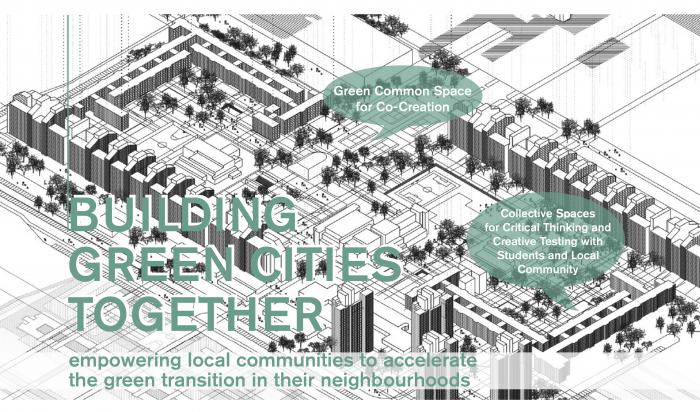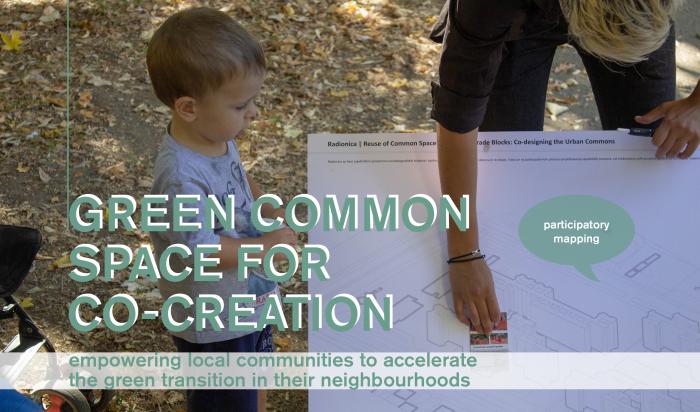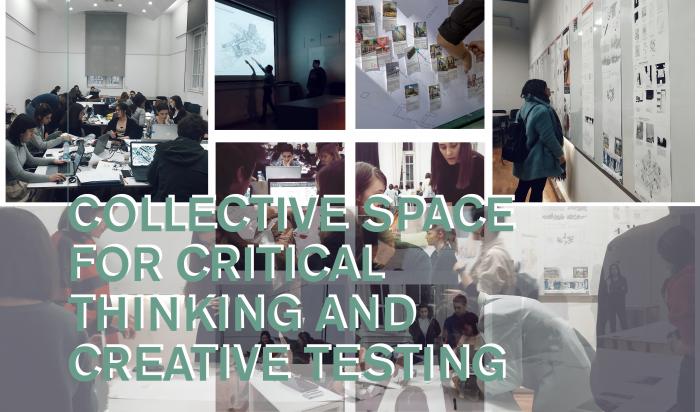I. SUMMARY INFORMATION
Project
269009
Status
Submitted
Award category
Reinvented places to meet and share
You want to submit
NEW EUROPEAN BAUHAUS RISING STARS : concepts or ideas submitted by young talents (aged 30 or less)
Project title
Green Common Space for Co-Creation
Full concept/idea title
Collective Spaces for Empowering Communities to Accelerate the Green Transition
Description
The project explores potential of the existing common spaces in residential neighbourhoods for empowering communities to accelerate the green transition and co-create shared places in a form of an urban experiment. Green common spaces of residential neighbourhoods evolve into collective spaces for critical thinking and creative testing with students and local community. The education-exploration and co-design prototype is a generative solution and adaptable for different European sites.
Where is your concept/idea being developed or intended to be implemented in the EU?
Germany
NRW
Emilienstr. 45
Detmold
32756
II. DESCRIPTION OF THE PROJECT
Please provide a summary of your concept/ idea
The project explores potential of the existing common spaces in residential neighbourhoods for empowering communities to accelerate the green transition and co-create shared places in a form of an urban experiment. Green common spaces of residential neighbourhoods evolve into collective spaces for critical thinking and creative testing with students and local community. The education-exploration and co-design prototype is a generative solution and adaptable for different European sites.
The model has been in development for three years now at TH OWL (Germany) and TU Delft (Netherlands) and has been tested on a case study already. New Belgrade (Serbia) was selected as the first case study, being one of the largest modernist post-war mass housing areas in Europe. As an important representative of European mass housing, it served as a platform for testing the education-exploration and co-design prototype in collaboration with University of Belgrade - Faculty of Architecture (Serbia). During the process of research, and in collaboration with a colleague at TU Delft, a comparative analysis was conducted with another European post-war housing area, Almere Haven (Netherlands). The preliminary results show many complementary aspects and highlight adaptability of the education-exploration model for different European regions and their residential neighbourhoods.
In the following period, it is planned for education-exploration model to be applied on a case study in Frankfurt (Germany) in collaboration with TH OWL (Germany). The goal of the project is to establish this model as an generative education-exploration prototype and as a pan-European validated tool for empowering local communities to accelerate the green transition in their neighbourhoods.
Please give information about the key objectives of your concept/idea in terms of sustainability and how these would be met
Sustainability is addressed on different levels within the proposed model. The main aim of this model, which is to accelerate the green transition and prove the transformative power of the existing residential neighbourhoods in European cities, is in line with the existing European and global international policies and agendas, especially addressing UN Sustainable Development Goals and Green Deal. Developing tools for green transition of urban residential neighbourhoods has a major role in securing sustainability of European cities. Addressing this issue within an education-exploration model, as an approach, has a potential for multi-level impact: knowledge production and knowledge sharing, awareness-raising and social engagement for the green transition. As a generative solution, it is reusable and transferable to different European sites, and applicable even to different topics or fields of education and exploration. Its (re)generative character ensures sustainability of the model.
Please give information about the key objectives of your concept/idea in terms of aesthetics and quality of experience beyond functionality and how these would be met
The specific purpose of this education-exploration model is to improve the quality of experience for students, offering a platform for critical thinking and creative testing as an extra-curricular learning model. The place-based, exploratory approach is enriching their learning process, and enabling their social engagement in creating green, inclusive and aesthetic environment. Moreover, the model is offering an advanced experience for the local community through their direct participation in this co-creation process. The project is promoting the aesthetics of vibrant, creative, urban spaces, that are enabling open and diverse dialogue in cities. In addition to that, the project aims to safeguard the existing tangible and intangible values of green common spaces in post-war residential neighbourhoods, that are important part of the modernist legacy and modernist aesthetics. Furthermore, it reflects on Bauhaus legacy in promoting multi-disciplinary, socially engaged and artistic-exploratory education model by offering a platform for critical thinking and creative testing for both students and local communities.
Please give information about the key objectives of your concept/idea in terms of inclusion and how these would be been met
Inclusion is addressed on multiple levels within the proposed model. The main aim of this model, which is to accelerate the green transition and prove the transformative power of the existing residential neighbourhoods in European cities, is in line with The New Leipzig Charter that is focusing on the pursuit of the common good using the transformative power of cities. The goal of this project is to safeguard against overexploitation of the common goods, particularly green common spaces in cities, and by reusing and reactivating them to prevent social, economic, environmental and territorial inequalities. The project supports transformation towards green, inclusive and proactive societies that leave no one behind, and therefore has a high social purpose. It affirms active participation and multi-level inclusion in creating high-quality, open and safe green common spaces that provide equal opportunities for everyone, regardless of socioeconomic status, gender or age, to interact with their living environment and integrate into society.
Please explain the innovative character of your concept/ idea
Green common spaces in our cities have been understood as open laboratories for testing innovative forms of education, exploration, problem-solving and co-creation. The proposed education-exploration model is applied in a form of an urban experiment for creative testing with students and local community. The innovative character of the concept is reflected in it juxtaposing the knowledge production and knowledge sharing with awareness-raising and social engagement for the green transition. Its (re)generative character makes it reusable and transferable to different European sites, and applicable even to different topics or fields of education and exploration. Furthermore, as an extra-curricular learning model, it is an innovative education method that is offering an advanced experience for the students, confronting them with the contemporary urban problems and including them in problem-solving through co-design process with local community.
Please detail the plans you have for the further development, promotion and/or implementation of your concept/idea, with a particular attention to the initiatives to be taken before May 2022
The preliminary results show many complementary aspects between different post-war housing areas and highlight adaptability of the education-exploration model for different European regions and their residential neighbourhoods. The goal of the project is to establish this model as a generative pan-European validated tool for empowering local communities to accelerate the green transition in their neighbourhoods. In the following period, it is planned for education-exploration model to be applied on a case study in Frankfurt (Germany) in collaboration with TH OWL - Detmold School of Architecture and Interior Architecture (Germany) in the following academic year. The outcome of the process are to be validated and conclusions drawn. Moreover, promotion of the model is planned in the conference Optimistic Suburbia II: Middle Class Mass Housing Complexes in June 2021, within different networks such as Docomomo International, Docomomo Germany, COST Action European MCMH, and different research project partners, but also in further teaching and research activities.
III. UPLOAD PICTURES
IV. VALIDATION
By ticking this box, you declare that all the information provided in this form is factually correct, that the proposed concept/idea has not been proposed for the New European Bauhaus Rising Stars Awards more than once in the same category.
Yes


